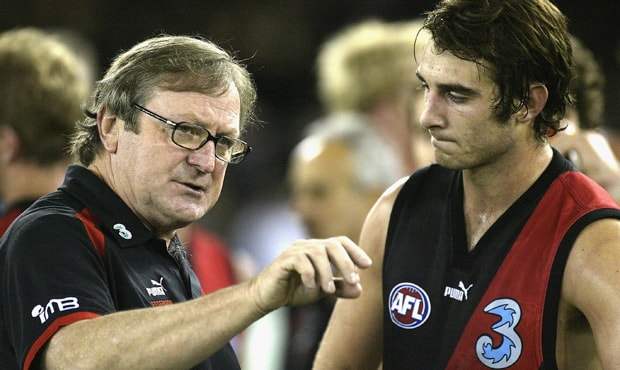WHEN I first took over at Essendon, I had no idea how to coach an AFL club.
I was just hoping I'd be good and in the end I was ok.
I only really got coached by one person in Tom Hafey, and then towards the end by Barry Richardson.
They were both very different and both had talent obviously.
All Tommy knew was that I was a plumber and if Tommy gave me a bake, then I deserved it, because he very rarely did.
When he did, I really had to sit and listen. But that was ok.
Tom Hafey coached his players to get them to play the way he wanted, using his style, because of his own personality.
He very rarely ridiculed players. That's why most of his coaches went on and had very good success.
These days, I would think there's even less time for ranting and raving because the players need communication in the game.
They need to be told what they can do better and what structures we have to keep.
There will be times when you pick your moments.
If I want to deliver a message straight out of the 'Guns of Navarone', I'll pick the moment, and that's the art of coaching.
But less is more these days. The most important thing in the end is the education of the players.
Right now, I'm basically coaching an under-20 side.
Most of them don't have a car licence and are heading towards their 21st birthday in the next year or two.
They're good listeners and they're getting better at listening, which is important because they're coming out of being young superstars in their grades.
One thing they know is when they run out to play on an AFL champion, they'd better be well equipped with knowledge and their positioning of the play.
That's why we have a very experienced group of coaches and also some coaches who have just come off the paddock in Luke Power and James McDonald.

Sheedy imparts some knowledge on Jobe Watson in 2004. Picture: AFL Media
It's a blend. We've got a head coach at my age and experience, then we've got Leon Cameron who is in his 40s and Al McConnell who is in his 50s and we're all trying to teach these players.
When you're not playing well, you have to work out how to play better.
I look back to the Essendon game against North Melbourne in 2001 in the greatest comeback ever.
We were more than 10 goals down in the second quarter and I've never had a coaching group so positive.
All they were interested in was 'how do we get back in the game?'
It's no good ridiculing players and taking their heart and soul out. We had to get them to believe immediately that the game was still there to be won.
Fortunately that day we had 90-odd minutes to rectify the bloody problem, which we did.
We got back in the game and we won it. And that's over a decade ago.
So it's not just about young players today, it can be any side.
I don't think ranting and raving is effective. Most of the time I've been that way anyway. I'm not as authoritarian as I used to be.
It's about discipline and responsibility for the position you're given as a player. That's for us to coach and to teach into the players.
I find nowadays that some footballers have been taught by their managers to be more self than team.
Not all of them, but some.
In general their parents are pretty good, they know their kid more than most, but the manager is always trying to get the best deal.
When I first started coaching, there was hardly a manager out there.
There are a lot of different things on the menu now.
But I don't think there would be one player at the Giants who would think I'd actually torn his heart out and not given some sort of general, basic knowledge of where you are and where the game is at and the journey you have to get to.
I don't think there's enough time to worry about the muck ups and turnovers and dropped balls and missed goals.
When you're in the situation of building a young team, you better give them belief and confidence they're moving in the right direction, even though they're being beaten by an opponent or as a team in a game.
And at the end of the year you know what? We end up getting better.
I can tell you now, if you did it the other way, you'd be going nowhere very quickly.
Coaches should be sponges and take every bit of knowledge from people that they can.
The thing I like about our team is they're growing up very quickly.
We're learning – and I can't ask for any more than that.



